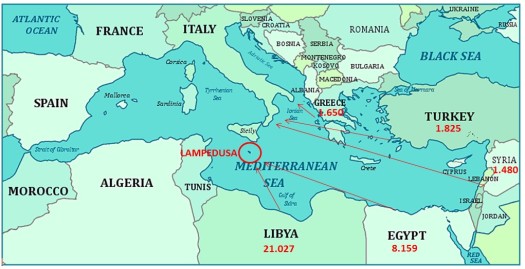by Tommaso Cinquemani
Mohammed stares at the sea in front of him. He lost his mother, his father, and his little brother in the attempt to cross the Mediterranean Sea. When their boat, shared with another 440 migrants overturned, they fell overboard. Mohammed has seen his relatives sink into the darkness of the sea. It was the 3rd of October and in the shipwreck 362 persons died. After eight days another tragedy: 21 deaths.
The war in Syria and in Somalia, the famine in Eritrea and the ‘spring revolution’ in North Africa push thousands of migrants to try to cross the Mediterranean Sea to reach Europe. Because of its geographical position, Italy is the destination of these desperate people. The Italian Coast Guard rescue thousands of migrants every year, but a lot of them still die. The public opinion debates over whether illegal immigration should be a national problem. Refugees arrive in Italy, Spain or Greece and then they move to Germany, Great Britain and to other countries. Enrico Letta, the Italian prime minister, asked for a European answer to the problem.
As a matter of fact, the European Union has its own agency, called Frontex, dedicated to contrast illegal immigration. “Frontex is the European agency that provides support in border control”, says Ewa Moncure, the press officer of the organisation. “Today we have two operations in Italy. We are deploying four boats, two airplanes and a helicopter. These forces are from the EU member states, including Italy”. Frontex has its own budget (6,5 milion Euro allocated for the Italian crisis), but ships and helicopters must be provided by the EU member states. Its aim is just to coordinate the help and provide support at border control.
According to Salvatore Iacolino, Italian member of the European Parliament of the PPE and Vice-Chair of the Committee on Civil Liberties, Justice and Home Affairs, “Frontex, as it is, doesn’t work. The proof is in the everyday landings. First of all there should be a greater dialogue between this organisation and the states that are at the forefront in the fight against illegal immigration. And then it needs much more founds”.
According to the Italian Ministry of the Interior official records, from the beginning of 2013, 14,35,085 migrants have landed in Italy. From Syria came 9,805 persons, 8,443 from Eritrea, 3,140 from Somalia, 1,058 from Mali and 879 from Afghanistan. 73% of these are asylum seekers. The flux shows that Libya is the port preferred by traffickers: 21,027 immigrants arrive from Tripoli, 8,159 from Egypt, 1,825 from Turkey, 1,650 from Greece and 1,480 directly from Syria.
Even Cecilia Malmstrom, Commissioner for Home Affairs, asked for a stronger European engagement: “The last tragedy in the Mediterranean Sea demonstrated that a stronger Frontex operation is compulsory”. Visiting Lampedusa, the island where this survivors are looking for the European hope, the Commissioner said: “I ask to the European countries to immediately provide the necessary resources to define Frontex operation”. And Manuel Barroso, President of the European Commission, paying his respects in front of rows of coffins, said: “Europe cannot turn away. This tragedy today shows that it is indispensable to step up our efforts”.




